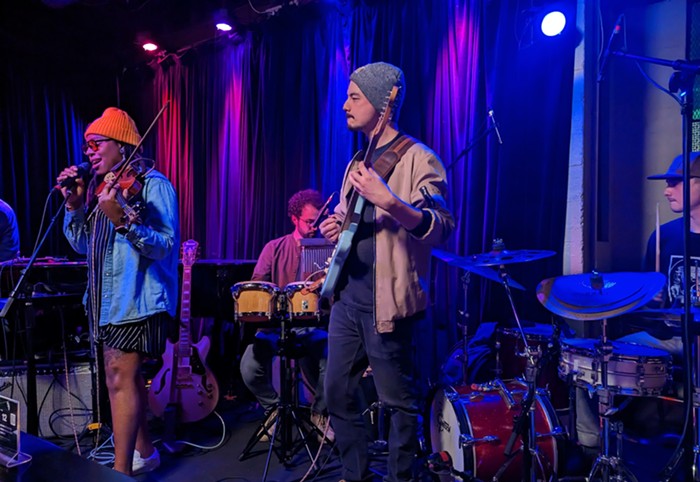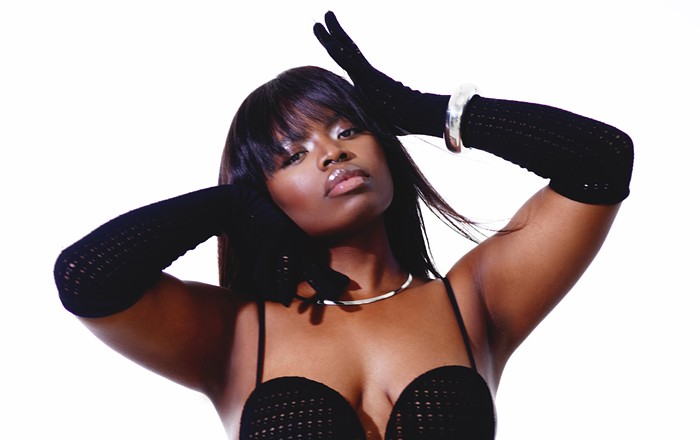Fri Dec 10
Bossanova
722 E Burnside
Most bands wear their influences like unsightly acne marks on their faces--bright crimson things screaming of youthful inexperience, that in due time they'll eventually learn to cover up. The word "influence" has in recent years become almost synonymous with the idea of post-modern hackery, where instead of blending a subtle palette of your collected experience, the lazy take the easy route of just lifting Joy Division's formula so deliberately that you can't read a record review without rolling your eyes. The common solution to this dilemma is the admirable route of eclecticism--molding a subtle and tactful amalgam of variables great and small into a seemingly original whole. Another, more adventurous solution is one of striving to imitate the impossible--aiming to reach the heights of the inimitable not by mimicry, but by tapping the impalpable id of your heroes.
Which is all to say that it's okay if everyone says that the Arcade Fire sound a lot like the Talking Heads. Like so many of rock music's timeless collectives, the formula of the Talking Heads was so indefinably specific that no one could ever possibly hope to imitate it. The Arcade Fire are to the Talking Heads something like what Iggy Pop was to Jim Morrison, or even what, say, David Bowie was to Elvis--hero worship that transcends mimicry, and creates something altogether different. Something brilliant.
You've no doubt already read about the Arcade Fire somewhere or another--they've recently been inked in The New York Times and Rolling Stone--and if you haven't, I assure you that this won't be the last time you do. The Montreal septet released Funeral, their full-length debut, this September on Merge, to near universal acclaim, and has in those few months skyrocketed from indie obscurity to... well, the fucking New York Times. Founded on the shoulders of a musical partnership between married couple Win Butler and Régine Chassagne, Funeral is a burning, urgently dramatic song cycle--an irresistibly cathartic exorcism that rings with careful, beautiful sincerity. Tautly blanketed in all of the great themes--life, death, love, loss, youth, aging, memory, etc. --the record is a deeply human expression; a momentum of such pleading velocity that it's hard not to see it all as a sort of theatrical call to arms.
Funeral was written in the looming wake of family deaths for both of the band's main contributors--a fact felt not so much in mourning, as in a moving celebration of life. Primary vocalist Butler borrows heavily from the David Byrne school of songwriting--quavering hiccups and all--as he reflects on cataclysmic landscapes with Byrne's almost removed sense of clarity. In the album's opener "Neighborhoods #1 (Tunnels)," Butler paints the picture of a neo-Ice Age wherein our star-crossed heroes abandon their weeping parents (and, presumably, society at large) to begin again outside--only to yearn for the memories that quickly begin to elude them. "Wake Up" re-envisions Byrne's yearning rejection of adulthood's emotional complacency suggested in "Dream Operator." Unlike Byrne, Butler constantly lets his emotions get the best of him--replacing Byrne's detachment and subtlety with a matched sense of passion and bombast.
What the Arcade Fire borrow from their heroes--careful, calculated delivery, wide-eyed fascination with its subject matter, academic innocence--never overshadows the band's own discovery and invention. Where most bands with their particular caliber of buzz simply revisit and replicate a palette of influence, the Arcade Fire have surpassed their collective consciousness to make something far more important. In the span of 10 songs, the Arcade Fire has created a cohesive epic, a cultish fanbase that grows larger with every show they play, and a media frenzy (and an impending backlash) that may all but consume them. In a mere 10 songs, the Arcade Fire have released the best album of the year.


















